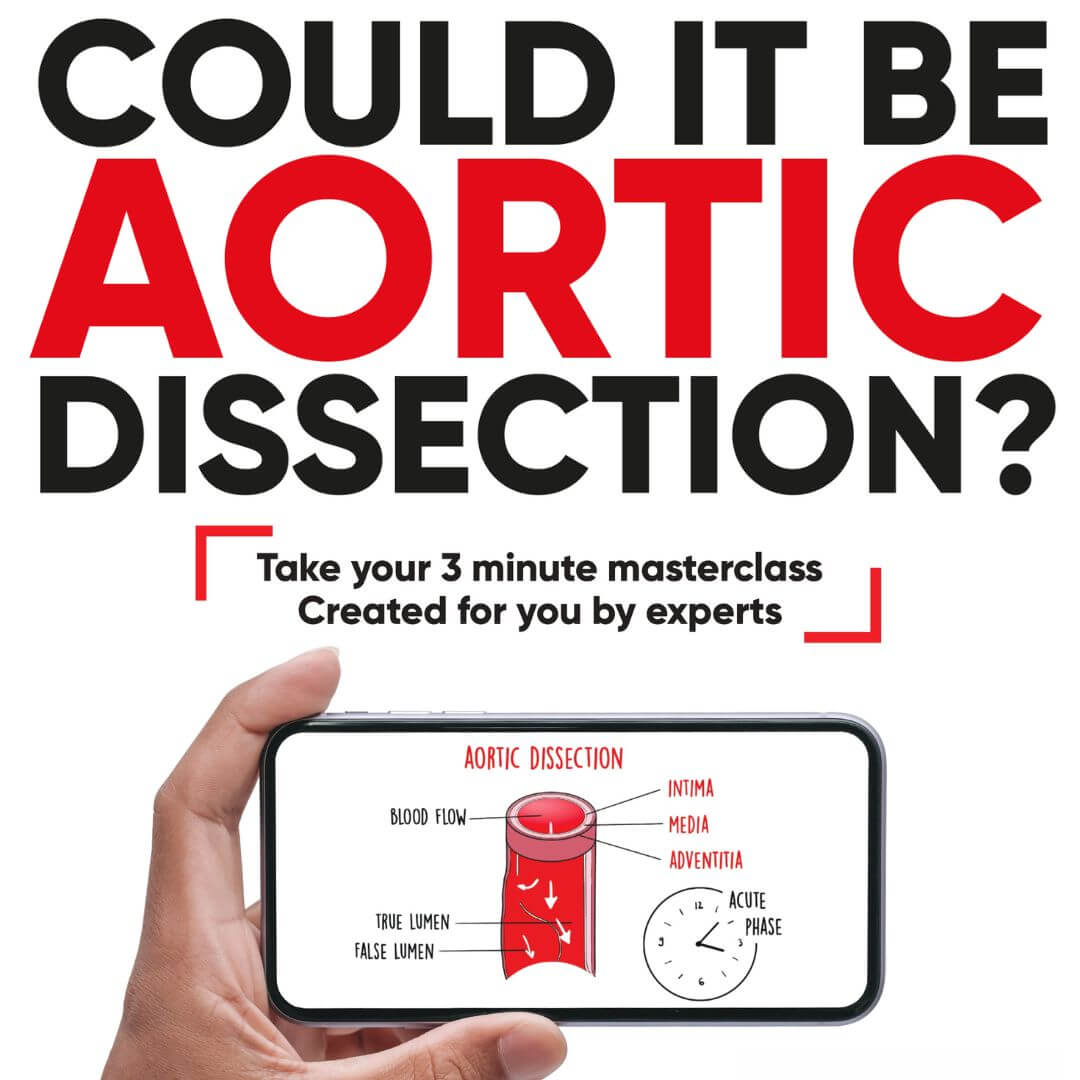The recent webinar hosted by the British Insurance Brokers Association (BIBA) and the Aortic Dissection Charitable Trust provided crucial insights into securing insurance for individuals who have had or at risk of aortic dissection and related genetic disorders such as Loeys-Dietz syndrome, Marfan syndrome, aortic aneurysm, Noonan syndrome, Ehlers-Danlos syndromes, and Turner syndrome. This Ask the Experts session highlighted the unique challenges faced by patients and those at genetic risk, offering expert guidance on navigating the complexities of insurance policies.
Expert Insights from the Webinar
The session opened with remarks from Richard, a type A aortic dissection survivor, illustrating the real-life impact of these medical conditions on insurance processes. Graeme Trudgill, CEO of BIBA, detailed how insurance brokers can assist patients in finding suitable insurance cover, particularly in areas like travel insurance, where he clarified that aortic dissection alone should not lead to excessive premiums or denial of cover.
Graeme stressed the importance of honest disclosure of medical conditions when seeking insurance. He outlined key factors influencing insurance premiums, including age, duration, travel destination, and specific health details. These elements are essential in calculating the risk and subsequent premium costs.

Richard Bonella
Type A Aortic Dissection Patient

Graeme Trudgill
BIBA Chief Executive

Garry Nelson
Head of Corporate Affairs at AllClear Travel Insurance

Johnny Timpson OBE
Former Cabinet Office Disability and Access Ambassador
The British Insurance Brokers’ Association
BIBA plays a vital role in supporting individuals with complex medical histories to find appropriate insurance cover. As a not-for-profit association, BIBA connects patients with brokers who specialise in high-risk insurance cases, leveraging a network of 1,800 regulated firms across the UK.
Recommendations on Insurance Options
For travel insurance, BIBA suggests choosing destinations wisely, as medical costs vary greatly by country, which can significantly affect premiums. In terms of life and critical illness insurance, where insurers view aortic dissection as a serious risk, the webinar highlighted the need for patients to be prepared with comprehensive medical records when consulting with insurance providers.
Watch the full recording of our webinar and view the detailed responses to the questions raised by participants during the session.
Your Insurance Questions Answered
-
What is the best way to insure an electric wheelchair?
For insuring an electric wheelchair in the UK, there are two main options. Firstly, it may be possible to add the wheelchair to your existing home insurance policy. You should contact your home insurance provider to arrange this addition. Secondly, you can obtain a standalone electric wheelchair insurance policy. Such policies are available through insurance brokers and are designed to cover mobility scooters, protecting against risks like accidental damage, fire, theft, and mechanical breakdown. For further assistance or to explore these options, contacting the British Insurance Brokers’ Association (BIBA) is recommended.
-
Will life insurance companies insure someone with vascular Ehlers-Danlos syndrome?
Insuring someone with vascular EDS can be challenging, and it is advised to consult with a specialist broker, such as those available through BIBA. Many insurers are cautious about this condition, but options are available. Typically, life insurance cover might be limited to a 10-year term with a significantly higher premium—potentially 200% to 400% above the standard rate. Alternatively, guaranteed acceptance, whole-of-life plans (often marketed to over 50s) may be considered. These plans do not require medical underwriting but usually include a moratorium period where no death benefit is paid if the insured dies within the first 12 to 24 months. It’s also worth exploring occupational life insurance available through employment, which often provides cover under favourable terms and may include rapid payout options via trusts, bypassing probate. Individuals should ensure they understand the specific terms and potential benefits of such policies.
-
What guidance can be given to someone who finds insurance questionnaires, whether paper or online, confusing and struggles to provide clear answers?
The insurance industry has largely transitioned from paper to online application forms over the past two decades, which has streamlined many processes. For individuals with specific conditions like aortic dissection, it is highly recommended to work with a financial advisor who can guide you through the application process. This is especially important as the underwriting process is now more dynamic, beginning with a few general questions to understand the applicant’s basic health and risk profile. Based on these initial responses, the system then generates more specific questions tailored to assess the individual’s particular risks more accurately.
For those not using a financial advisor, navigating this system can be daunting due to the potential complexity and the breadth of questions (up to 10,000 possible queries). If you find yourself unsure about how to answer a question or what information is required, seeking help from a specialist advisor can be invaluable. They can clarify what information is necessary and help ensure that your responses accurately reflect your situation.
-
Is there anything that can be done about obtaining travel insurance when one is still undergoing investigations for palpitations and waiting for genetic results, particularly when insurers won't offer cover pending these outcomes?
This is a common issue, particularly post-pandemic, due to the backlog in medical consultations and tests. The challenge is for insurers to rate a risk without complete information. Typically, insurers are hesitant to provide cover under such uncertain conditions. However, there is a potential workaround: while insurers may not cover claims related to the undiagnosed condition once it is identified, they can still offer cover for all other declared conditions. This allows individuals to travel, provided they are willing to accept the risk that any claims connected to the undiagnosed condition might not be covered. This scenario forces a choice on whether the potential risk, given the severity and seriousness of the undiagnosed condition, is acceptable for travel. Essentially, while definitive cover for the undiagnosed condition is unlikely, other aspects can still be insured.
-
Why do insurance companies still consider someone with a stent for aortic dissection as a risk, when the general public may also be at risk of aneurysms and dissections without their knowledge?
There seems to be a misconception regarding how insurance companies evaluate risk. The key aspect insurers assess is the stability of the condition, including what treatment has been applied (e.g., stents), how long ago treatment occurred, and whether there has been any recurrence. The aim is to understand the current status and ongoing risk associated with the condition. For example, the timing of the stent placement (whether it was several years ago or more recent) and its success in managing the condition are crucial factors.
Insurers do not automatically apply a premium loading just because a treatment like a stent insertion has occurred. Other factors, such as the destination of travel (e.g., the US versus Europe), can influence the cost of the premium more significantly. It’s important not to assume that each question regarding past treatments automatically leads to higher premiums. In fact, there have been instances where premiums were notably low for individuals whose AD had been successfully treated, indicating effective risk management from the insurer’s perspective. Additionally, insurers might inquire about related issues like blood pressure medication to comprehensively assess health status, but this does not necessarily mean an increase in premium. It’s crucial to differentiate between the insurers’ need to understand the medical history and the assumption that this will lead to higher costs.
-
If undergoing routine medical monitoring, such as annual scans or tests, should this be declared even if it's not in response to any new or worsening symptoms?
Routine medical monitoring as part of ongoing management for a condition like aortic dissection does not typically need to be declared unless there are specific changes in your condition or treatment that arise from these check-ups. Regular monitoring is considered a standard part of managing existing conditions and usually doesn’t impact insurance assessments unless it leads to a change, such as a new diagnosis or alteration in medication. However, if your monitoring reveals changes that affect your health status, these should indeed be declared. This ensures there is no ambiguity in your insurance cover, particularly in the event of a claim. Always keep your insurer informed about any significant changes in your health as part of your ongoing duty to provide accurate and up-to-date information.
-
Is it better to have a joint travel insurance policy or separate policies when travelling with a partner, particularly if one partner falls ill and the other needs to stay longer?
It’s often advantageous to have a joint policy, especially when travelling with a partner who has a medical condition. Separate policies might not automatically cover situations where one partner needs to stay longer due to the other’s illness. A joint policy or adding a travel companion cover can eliminate ambiguity and ensure that both parties are adequately covered for such scenarios. This cover is particularly valuable if one traveller has a medical condition that could potentially disrupt the trip, as it addresses issues like cancellation and curtailment directly linked to the medical condition.
If your travel insurance is provided as a perk through a bank account or credit card, it’s crucial to confirm with your provider that you’re covered for travelling with someone who has a medical condition. Make sure that the policy does not exclude claims related to the partner’s medical issues, which might necessitate an extended stay or trip cancellation. Opting for a travel companion cover as an add-on is a small price for significant peace of mind, ensuring that both travellers are protected under one policy. This approach not only simplifies the claims process but also provides broader cover, making it a sensible choice for couples travelling together.
-
After undergoing surgical repair for an intramural hematoma, ascending aorta, and proximal arch replacement, should all these details be declared as medical conditions, and would they still classify the individual as higher risk even though they have been effectively repaired?
Declaring your full medical history, particularly for complex conditions like an intramural hematoma and surgical repairs of the aorta and arch, is crucial. However, being thorough in your declarations does not necessarily mean you will automatically be classified as higher risk. Insurers have sophisticated screening processes designed by medical professionals that take into account the specifics of each condition and its treatment outcomes.
If you’re unsure about how to declare your condition or the specific details required, it’s advisable to contact the insurance provider directly rather than relying solely on online forms. This approach allows you to discuss your specific medical scenario with someone who can guide you through the medical screening process.
This direct interaction helps ensure that your condition is accurately assessed and that you receive the appropriate cover. It also minimises the risk of miscommunication or underdeclaration that could affect claim processing. In cases like this, where the condition and its treatment are complex, speaking directly with a trained operator is strongly recommended to talk through any areas of uncertainty and to ensure all relevant medical information is correctly declared.
-
Does the cost of travel insurance vary depending on whether the journey is long-haul or short-haul, particularly from a medical perspective?
Yes, the distance of travel can significantly influence the cost of travel insurance, and this difference isn’t solely based on medical conditions. Longer journeys, especially long-haul flights, come with additional risks such as the cost of repatriation in case of medical emergencies. Longer flight durations, changes in temperature and humidity and significant time zone changes, can all have adverse effects on certain medical conditions and the frequency of claims.
Moreover, the geographic classification of ‘Europe’ in travel insurance terms includes not only European countries but also any country bordering the Mediterranean, which might incorporate some North African countries. This broad definition affects the calculation of travel distance and subsequently the insurance cost. Longer distances like trips to the Far East, America, or South America generally incur higher premiums due to various factors, including the absence of reciprocal health agreements like those in place with certain countries like Australia.
These geographical and logistical factors must be considered alongside personal health conditions when assessing travel insurance costs. The further away the destination, the higher the likelihood of increased insurance costs, which is crucial for travellers to understand when planning trips. Additionally, if you are applying for life insurance and intend to live outside the EU for any period, this must also be disclosed to your insurer as it can affect their underwriting decisions.
-
If someone undergoes prophylactic surgery advised by a cardiologist and wishes to return to sports participation, though it's not certain to be safe, would they still be insurable for travel and life insurance, even if this might be considered taking on extra risk?
Insurability in such cases involves a highly individualised underwriting process, focusing on the specifics of the risk presented, the level and duration of cover required, and the nature of the sport involved. The key factors insurers consider is not just the surgery itself but also the decision to resume sporting activities post-surgery. The type of sport, its competitive level, and the environment in which it is played are all critical in assessing the risk.
For someone engaging in potentially high-risk sports activities post-surgery, it’s essential to discuss these details with an insurance advisor who may need to look for a specialist insurer equipped to handle such unique scenarios. The insurance industry has guidelines on what types of sports are generally insurable and those which are considered too risky.
Therefore, each case is assessed on its merits, and while prophylactic surgery might resolve a potential health issue, resuming high-risk sports could complicate the insurance assessment. It’s advisable to provide all relevant details to your insurer or broker so they can accurately evaluate the situation. Insurers aim to cover risks they fully understand, so thorough and honest disclosure is crucial to finding suitable cover.
Insurance Resources
The webinar reassured that while obtaining insurance with a pre-existing condition like aortic dissection can be daunting, there are mechanisms and expert help available to support patients. BIBA’s resources, including their Find Insurance Services and Aortic Dissection Patient’s Insurance Handbook are designed to assist individuals in accessing the necessary insurance cover effectively and responsibly.
This session is a reminder of the critical importance of understanding the intricacies of insurance for those with significant medical conditions, ensuring they receive the cover they need without undue hardship.

BIBA’s Find Insurance Service
BIBA’s Travel Medical Directory





